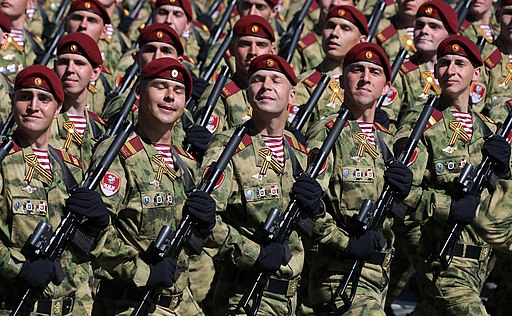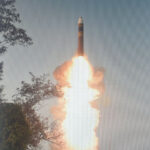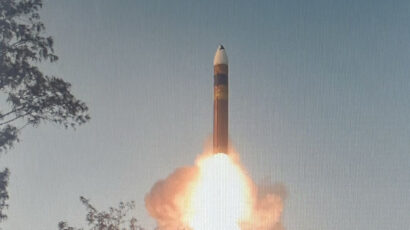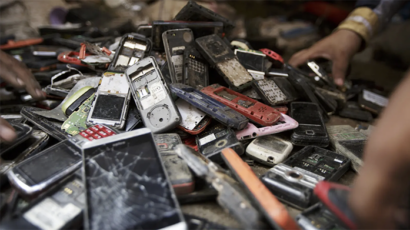In Ukraine, Putin tries his hand at nuclear blackmail. Here are seven ways to thwart him.
By John Erath | December 17, 2021

It is December 2021, and Russia is threatening Ukraine. Again. Since the 2014 seizure of Crimea and de facto occupation of the Donbas, signals that Russia may try for more of Ukraine are almost as regular as rumors that George R.R. Martin will finish the next Game of Thrones book. When these rumors arise, they are followed by firm statements that the international community will not tolerate such behavior, and then by rapid international denials of any intention to send troops to Ukraine or take any step that would increase the risk of violence. The reason for avoiding any such confrontation boils down to the entirely reasonable point that conflict with Russia risks the use of nuclear weapons. This is deterrence. No one will act if doing so may provoke a nuclear response. Yet in the present moment, Putin is putting the responsibility for avoiding nuclear war on others while turning the concept of deterrence backwards.
Putin knows that the principles of Ukrainian sovereignty and territorial integrity are important to the West but not as significant as the imperative of avoiding nuclear conflict. Moscow chose now to announce the possibility of returning nuclear-capable intermediate-range missiles to Europe as the timing not-so-coincidentally deters those who uphold a rules-based international order. Deterrence, in the nuclear context, is often considered to provide a measure of security. But in the Kremlin’s formulation, it does not prevent military aggression; it enables the Russian policy of dominating the former Soviet space, which Putin has described as “historical Russia.” The United States and its allies should not merely promise undefined consequences in the case of an invasion. Rather, they might address the threat by pushing for more aggressive arms control, committing to peaceful solutions, emphasizing the Budapest Memorandum, strengthening Ukraine as a state, and enforcing existing arms control tools.
The United States and its allies face a policy dilemma. On one hand, they have no higher priority than avoiding nuclear war. If they confront Russia over Ukraine, they increase the chances for nuclear war. On the other hand, if they allow Russia to seize parts of neighboring countries while gaining control over those states’ policy choices, they would confirm nuclear blackmail as a policy tool. Since 2014, Ukrainian opinion leaders have debated whether Ukraine, when it was the newly independent almost 30 years ago, was right to give up nuclear weapons. Now, Putin’s surrogates are making noises that Russia could use nuclear weapons to protect its interests in Ukraine. While confrontation between nuclear powers is never a good course, neither is a set of outcomes in which nuclear weapons could seem more useful in achieving policy goals.
The United States and its allies need to develop policies that lower the risk of nuclear proliferation and confrontation. Their policies should not reward Russia for its abuse of deterrence by relegating Ukraine to a Moscow-dictated sphere of influence. To succeed, policymakers must first understand that the Kremlin views Ukraine as an existential issue. Ukraine is a foundation of Russian culture and a permanent part of what many Russians consider their homeland. Putin’s vision that only strong state controls can be effective in governing Russians would falter if democracy and free markets were to thrive in Ukraine. Since Moscow will under no circumstances leave its neighbor alone, the United States and its allies should raise the opportunity cost for Russian interference in Ukraine. At the same time, they should help Kyiv strengthen not just its military but its economy and democratic institutions.
Most proposed responses to Russian aggression focus on two tools: military aid and economic sanctions. Given the importance of Ukraine to Russia, neither is likely to be effective. Moscow has weathered sanctions before. Also, any pain inflicted by further sanctions would, in Moscow’s view, be less than that which would come from seeing Ukraine independent of Russian influence. Similarly, Ukraine does not lack weapons. It faces a larger neighbor willing to go to any lengths to retain the ability to dictate its affairs. If the United States and its allies treat the situation as a purely military problem, they ultimately will increase the chances that nuclear weapons may be used.
An effective Ukraine strategy should focus instead on lowering risks of violence—not just for open conflict but also for threats of violence, especially those that imply that nuclear weapons could be considered—while increasing the opportunity costs. The United States and its allies should not merely promise undefined consequences in the case of an invasion. Rather, they might address Russia’s regular threats and Moscow’s ongoing policy of interference in Ukraine in the following ways:
Push arms control more aggressively. Negotiators have met to follow up the 2010 New Strategic Arms Reduction Treaty (New START) but so far have no results. The Russia-Ukraine standoff is made more dangerous by the presence of nuclear weapons and underlines the importance of reducing the possibility of nuclear use. Russia’s threats against Ukraine can be used to highlight a difference in approach, especially when coupled with proposals for additional cuts in strategic weapons and the elimination of non-strategic weapons—those most likely to be used in a battlefield scenario. Given Russia’s reliance on its nuclear capability for intimidation, Putin is unlikely to agree to significant cuts. However, if he responds negatively to US and allied states’ requests for concrete arms control initiatives, he will illustrate that Russia is outside the international mainstream. At the same time, he will weaken his preferred narrative of victimhood.
Commit to peaceful solutions. President Joe Biden has already ruled out sending American troops to Ukraine. He should now ask Putin to reciprocate—to renounce the use of force in Ukraine, particularly threats of nuclear action. Putin has argued, and will continue to argue, that Russian actions are only in response to Ukrainian provocations and in protection of Russian citizens living outside Russia’s borders. The United States and its European partners should raise the bar by setting a standard of avoiding violence, despite Moscow’s attempts at justification. Then, when Putin next decides to interfere with his neighbor, his international credibility would suffer.
Emphasize the Budapest Memorandum. In 1994, Russia, the United States, and the other nuclear states signed a memorandum that included security assurances against threats or use of force against the territorial integrity or political independence of Ukraine. These assurances were given explicitly in the context of Ukraine giving up the nuclear weapons it inherited from the Soviet Union. Although Putin has argued that supposed threats to Russian interests overruled the Budapest commitment, there was no provision in the memorandum qualifying the assurances. Russia should face calls from all Nuclear Non-Proliferation Treaty states to recommit, otherwise Ukraine’s obligation to remain nuclear-free could be undermined. Such calls will not change Putin’s policy. They could, however, isolate Russia further and clarify that Putin’s obsession with “historical Russia” negatively impacts actual Russia.
Strengthen Ukraine as a state. When policymakers seek to help Ukraine improve its military, they often overlook Ukraine’s weaknesses that make it easy prey. Since independence, many Ukrainian leaders have prioritized personal gain over building effective government. Russian influence and corruption have also played role. Still, one of Europe’s potentially richest countries remains stagnant, largely due to mismanagement. Fixing this situation will not be easy, especially because the most significant tool to do so—the prospect of EU membership—comes with a different set of political problems. Western governments must recognize that this is a long road and affirm that Ukraine has a European future in contrast to its Russian history.
Appropriate security assistance. If the United States and its European allies simply pour in weapons, they could increase the danger of nuclear conflict. Still, they need not forego all security assistance. It would be worth considering whether Ukraine would benefit from further professional military training and infrastructure improvements, including command and control arrangements. Defensive systems, such as fire finder radars, would help raise the costs of Russian military aggression without providing attack capability. Ukraine is in no position to apply for NATO membership, but it should be allowed to submit a Membership Action Plan. This step would carry no promise of eventual membership. It would, however, foster Ukrainian resilience by opening a variety of tools for reform of the military and the democratic structures that oversee it. The United States should not suggest stationing NATO forces in Ukraine; that would more likely raise, not lower tensions. A more capable Ukrainian military would also help negate suggestions that Ukraine should have nuclear weapons to defend its territory.
Turn the energy tables. Putin has not hesitated to use the Russian stranglehold on energy supplies as leverage on countries that depend on them. In the past, he has had to depend on Ukraine, through which most of the pipelines for Russian gas pass. With the completion of the Nordstream 2 link, Putin will gain the ability to cut off Ukraine without also cutting off the supply to western Europe on which the Russian economy depends. This should be turned against Russia. In arguing to President Biden that Nordstream was a good idea, the German government believed that it would give Europe leverage due to the importance of energy exports to Russia. This presents a good opportunity to test the German theory. Shutting down Nordstream, already under consideration, would strike a blow to the Russian economy more effectively than the normal menu of sanctions being considered. It could also ease pressure, at least temporarily, on Ukraine.
Apply existing arms control tools. While the nuclear dimension looms over the crisis, conventional weapons are the most likely conflict scenario. Thanks to Russia, there is no longer any conventional arms control in Europe. However, confidence-building measures, such as those established under the Vienna Document, could be put to use. The Vienna Document provides for transparency on troop concentrations and military exercises that could reduce tensions. Ukraine should implement these steps to demonstrate it has no aggressive intent and call on Russia to follow suit. Also, the 1995 Dayton Agreement, which ended the war in Bosnia, has regional arms control and verification measures that could be adapted to the Ukraine-Russia context. As with other possible steps, Putin is unlikely to play along. Still, the attempt would show commitment to a peaceful way forward and put Russia on the defensive diplomatically.
American and European leaders have recently warned of strong consequences should Russia invade Ukraine. Their statements are carefully framed to preserve the status quo but do not constitute an effective policy for resolving either the Ukraine crisis or the challenge posed by distorting nuclear deterrence. They do not provide consequences for the ongoing occupation of Ukrainian territory or the threats of nuclear weapons. Rather, they validate Putin’s use of deterrence to support his imperialist ambitions. To respond to the Ukraine situation, the United States and its European allies will need to delineate what is unacceptable behavior without increasing the risks of destructive conflict. Progress, while maintaining this balance, will be incremental. Over time, Russia’s cost of involvement in Ukraine should outweigh its perceived benefit. By emphasizing a constructive approach to arms control and non-proliferation, western governments can also refute the dangerous precedent of using the threat of nuclear weapons to deter strong responses to non-nuclear aggression.
Together, we make the world safer.
The Bulletin elevates expert voices above the noise. But as an independent nonprofit organization, our operations depend on the support of readers like you. Help us continue to deliver quality journalism that holds leaders accountable. Your support of our work at any level is important. In return, we promise our coverage will be understandable, influential, vigilant, solution-oriented, and fair-minded. Together we can make a difference.
Keywords: Europe, Putin, Russia, Ukraine, nuclear, nuclear risk, nuclear weapons, war
Topics: Nuclear Risk, Nuclear Weapons, Opinion
















Hi,
You should know the background story of the coup in Ukraine and what actually happened: https://consortiumnews.com/2014/02/23/neocons-and-the-ukraine-coup/
Also, search ‘Ukraine’ on the Consortium News website; you’ll find lots of info from award-winning investigative journalists and ex intelligence personnel, military & civilian.
All the best.
Perhaps it is all too easy to blame Putin, but; Look at it this way: Does NATO really have to extend to the doorstep of Russia? After the demise of the USSR there was absolutely no reason to so brazenly invite the nextdoor neighbours to Russia to join NATO. That surely is an invitation to a conflict.
Before Putin invades Ukraine, he’ll raze it back to the stone age. Brussels, too. So, it’s highly advisable not to poke the bear.
Putin’s trolls have joined the discussion. One thing should be clear: there is NO justification for invading your neighbor. Ukrainian political dysfunction and NATO’s open door do not legitimize violations of sovereignty.
These are all great ideas for dealing with a reasonable leader. Unfortunately, it would appear that Putin consolidated his power by murdering some 400 of his own soldiers and their families, and has maintained power by having his critics killed. For someone who lies so regularly and long, statements and pledges are a useless joke. There will be no peace while Putin lives. The withdraw will occur when Ukraine turns into another Afghanistan for Russia.